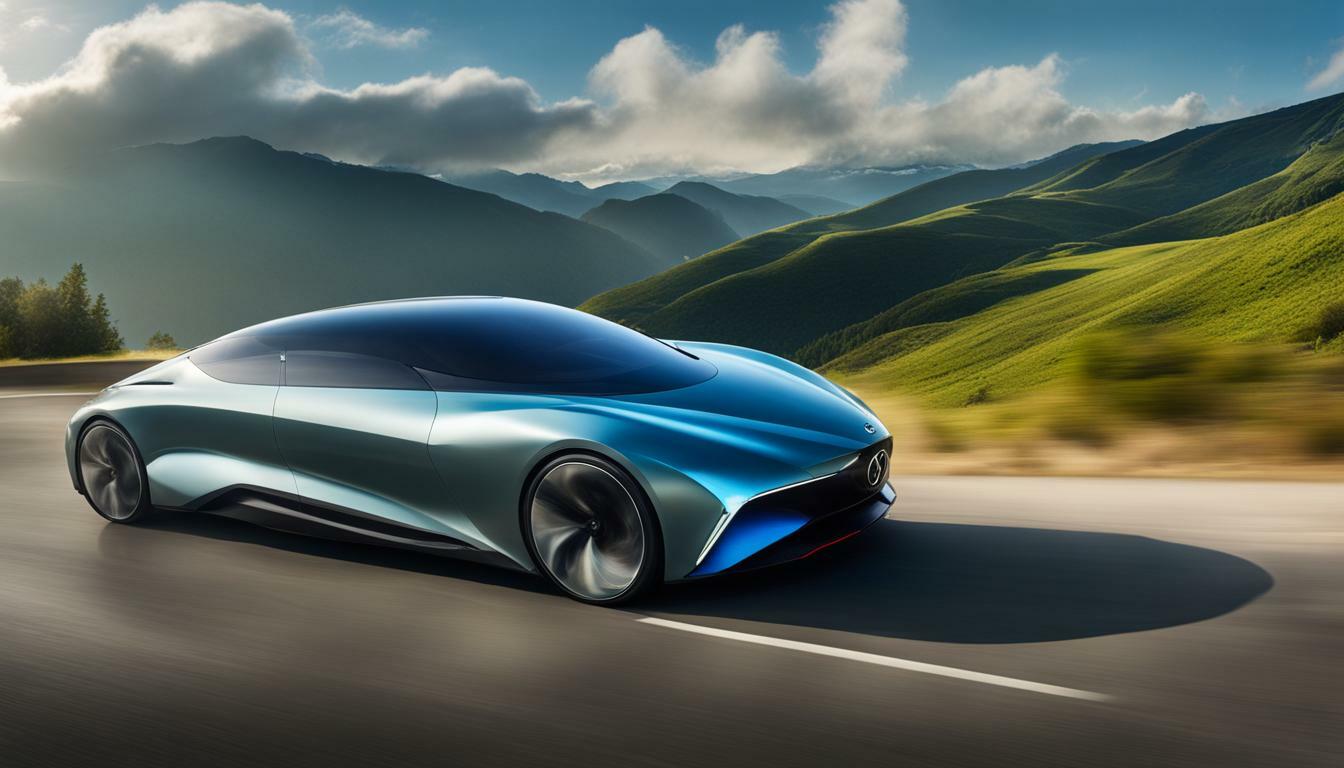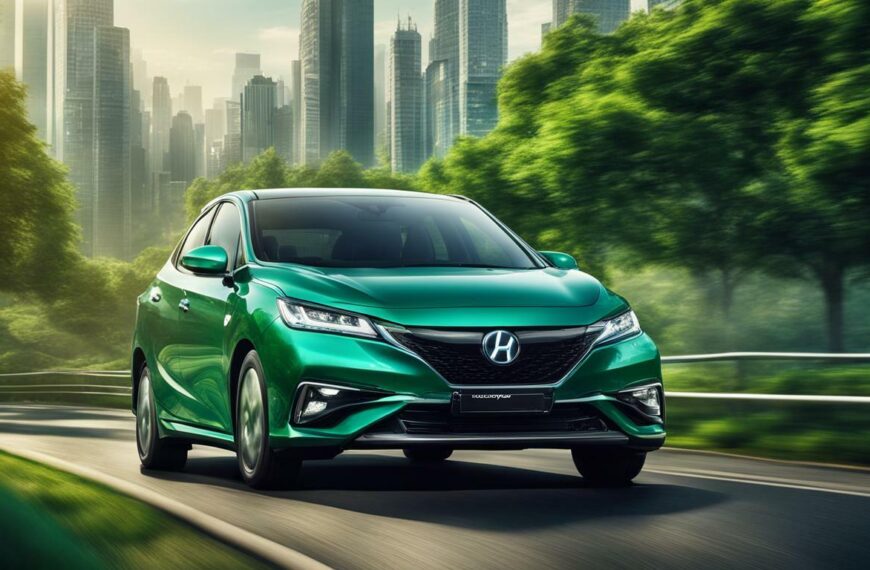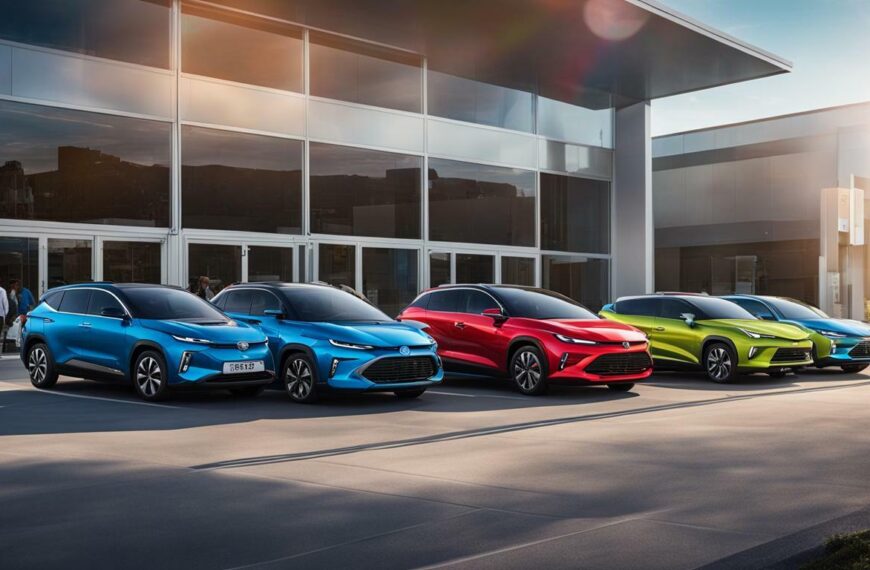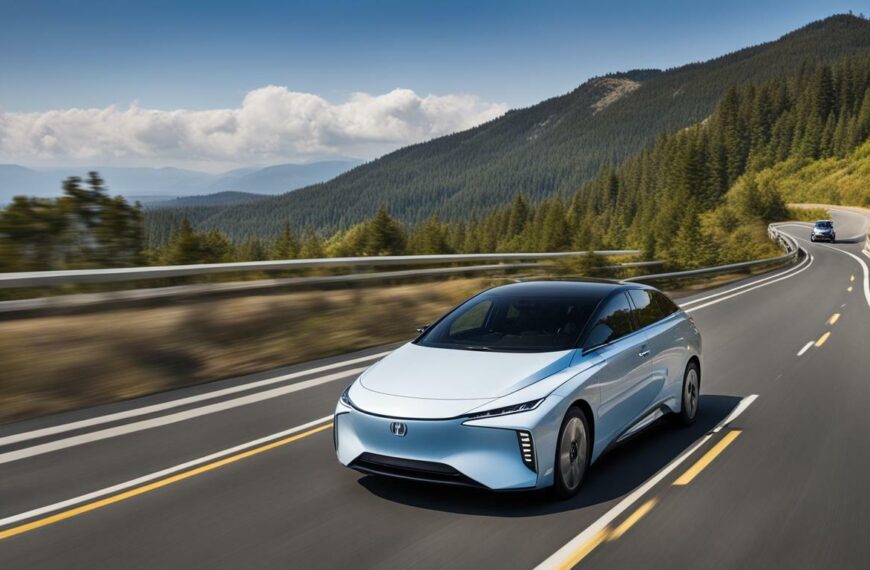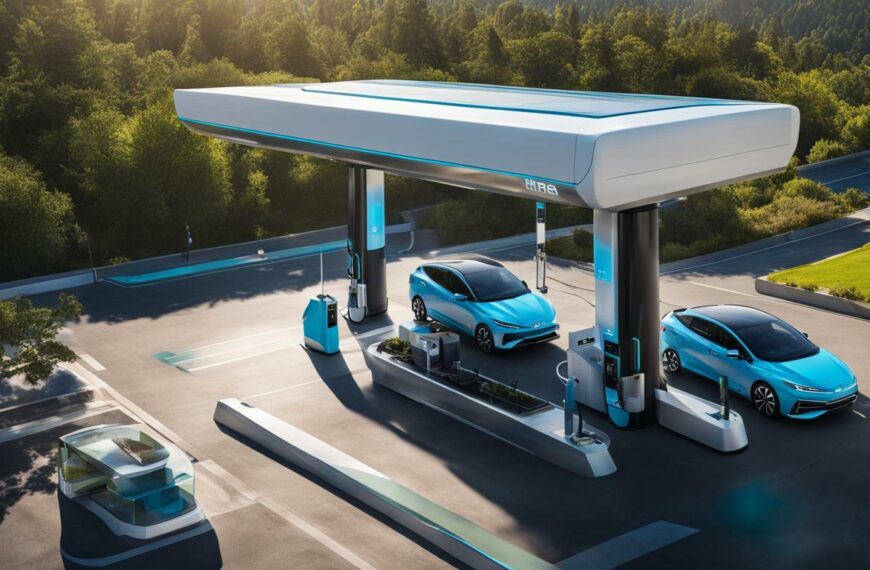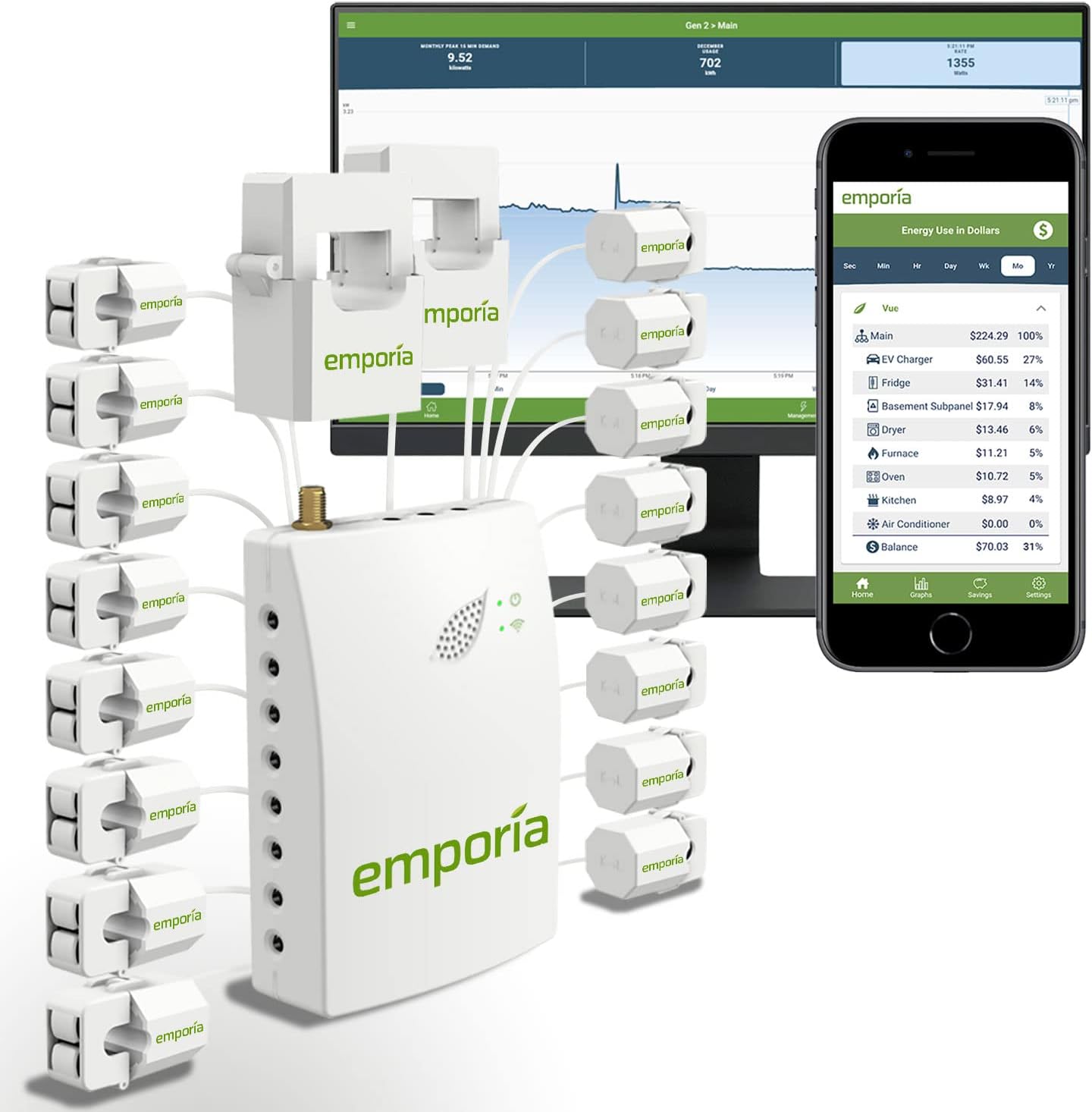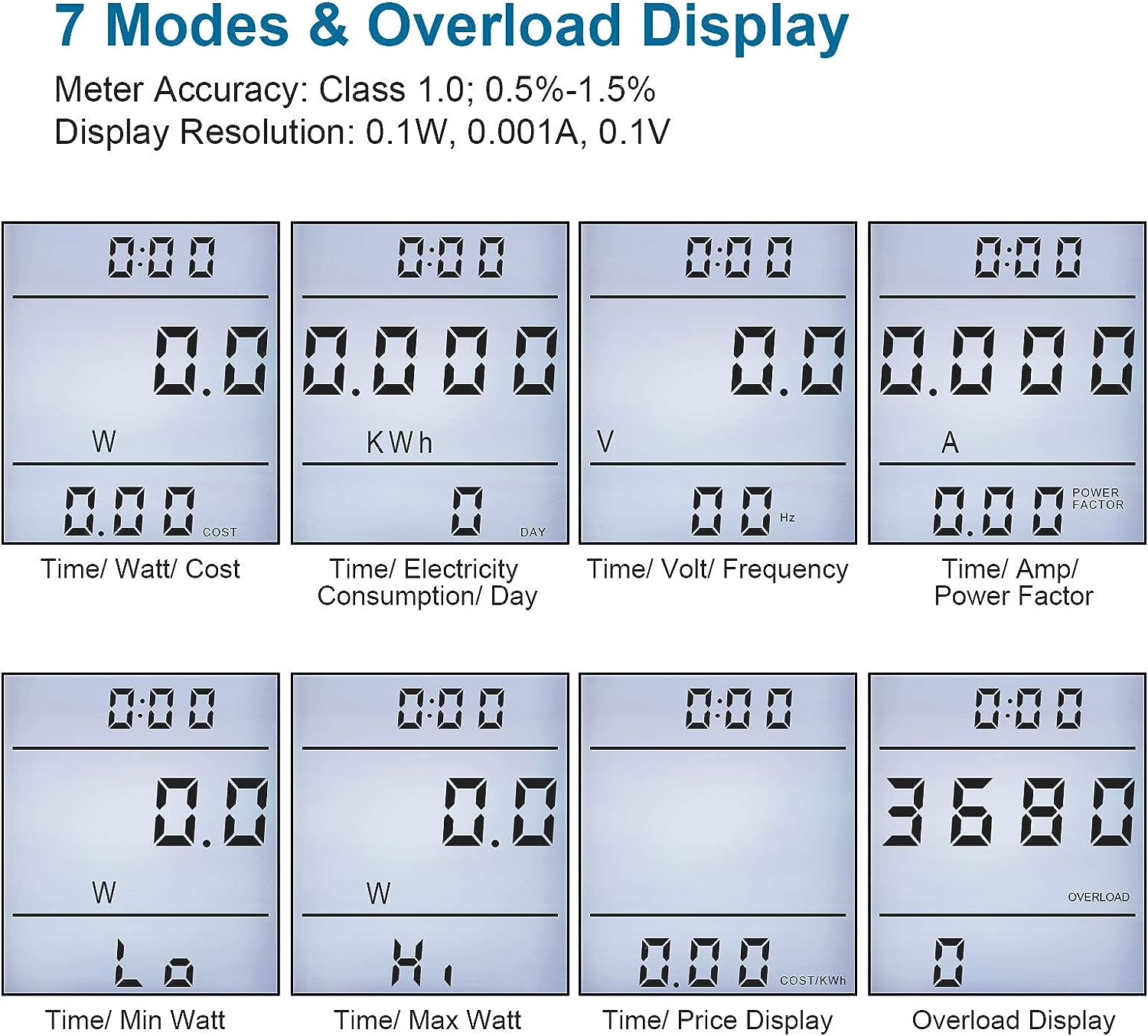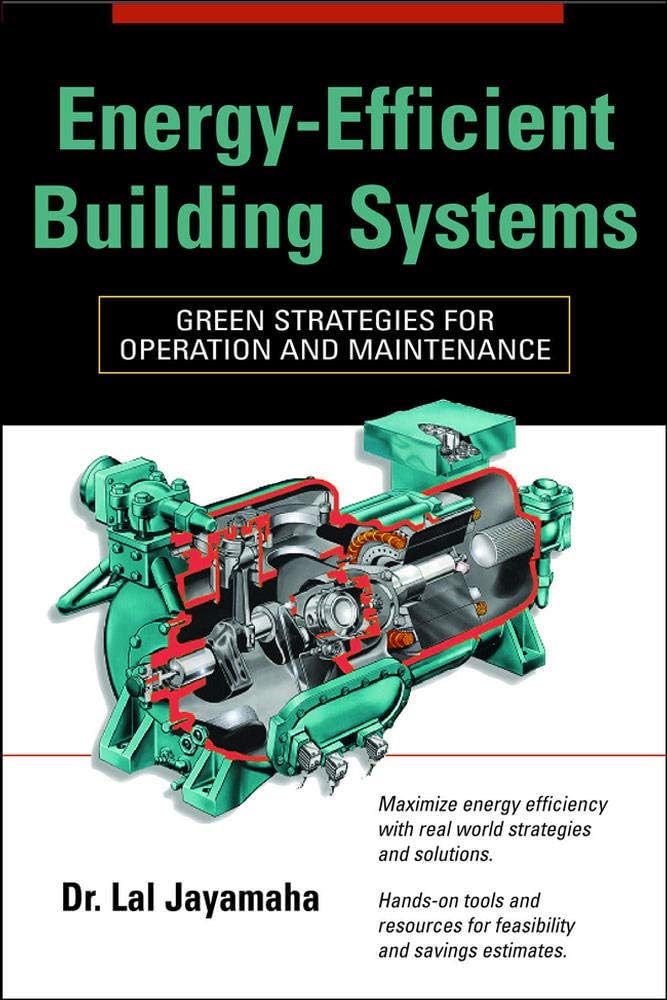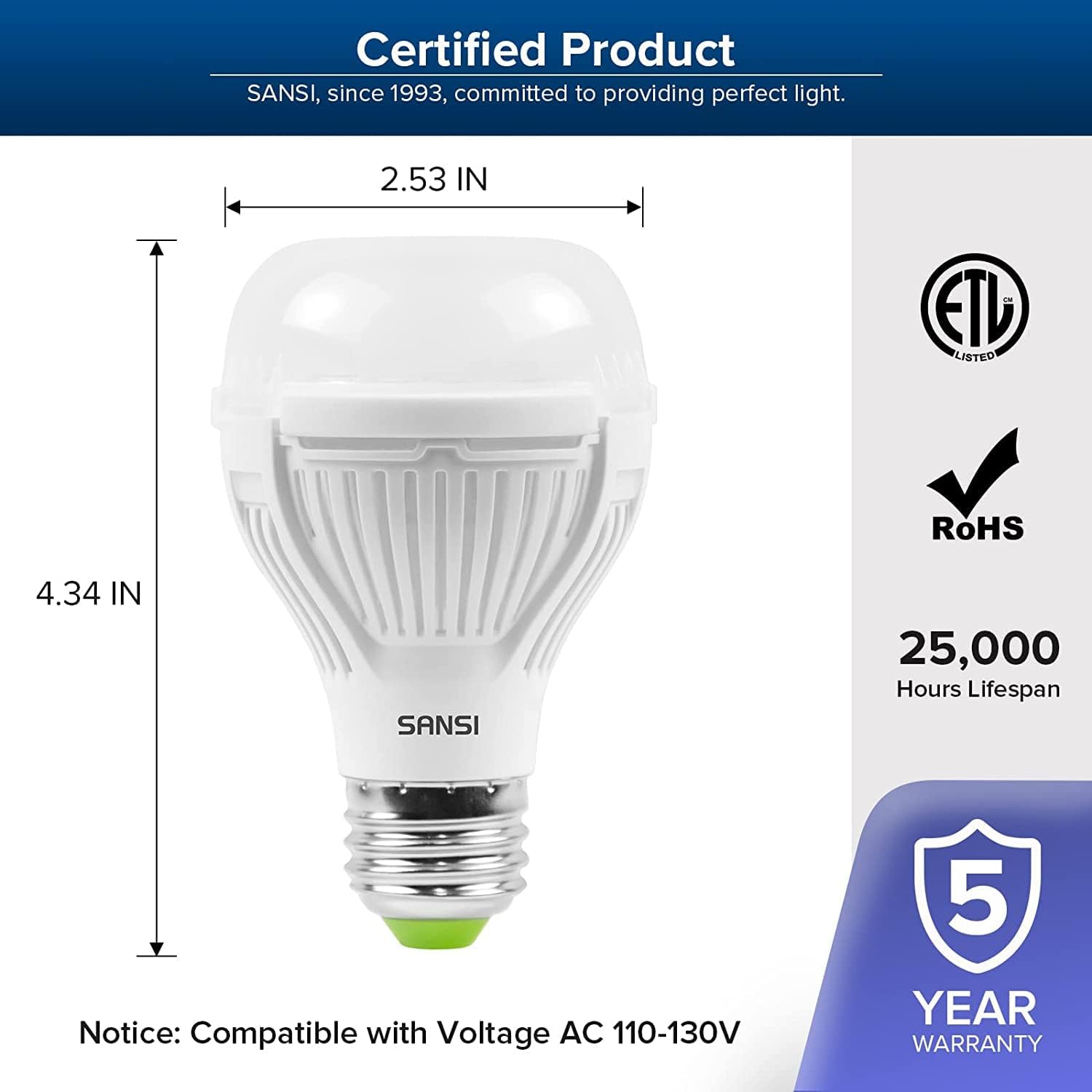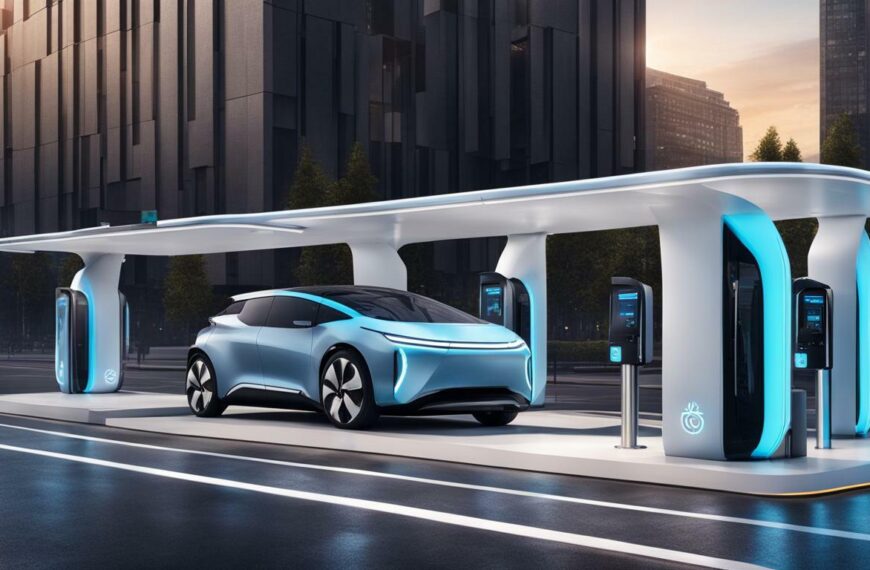Hydrogen cars are revolutionizing the automotive industry with their impressive performance and environmental advantages. These innovative vehicles harness the power of hydrogen fuel cell technology to offer a driving experience like no other. From enhanced speed and acceleration to quiet operation and zero emissions, hydrogen cars are paving the way for a greener future.
Key Takeaways:
- Hydrogen cars deliver thrilling driving dynamics thanks to their impressive speed, acceleration, and engine performance.
- These vehicles offer a serene driving experience with their quiet operation, providing a peaceful journey.
- With zero emissions, hydrogen cars contribute to a greener future by reducing greenhouse gas emissions.
- Hydrogen fuel cell vehicles provide increased range, allowing for extended journeys without the need for frequent recharging.
- The faster refueling times of hydrogen cars offer convenience and improved fuel efficiency compared to electric vehicles.
As hydrogen cars continue to gain momentum, the challenge lies in the development of hydrogen infrastructure. Currently, hydrogen fueling stations are less widespread than electric charging stations, limiting the availability of this alternative fuel source. However, companies like Hyperion and Toyota are investing in hydrogen car technology, aiming to overcome this challenge and bring practical and exciting hydrogen-fueled cars to the market.
Impressive Speed and Acceleration
One of the most notable performance benefits of hydrogen cars is their impressive speed and acceleration, providing an exhilarating driving experience. Hydrogen fuel cell vehicles, such as the Hyperion XP-1, are designed to deliver outstanding performance on the road. With its electric motors generating over 1,000 horsepower, the XP-1 can go from zero to 60 miles per hour in just over two seconds.
Compared to traditional combustion engines, hydrogen cars offer enhanced engine performance, thanks to the power generated from the hydrogen fuel cells. The unique combination of hydrogen and oxygen produces electricity, which then powers the electric motors. This efficient process results in quicker acceleration and higher top speeds, allowing drivers to experience the thrill of a high-performance vehicle.
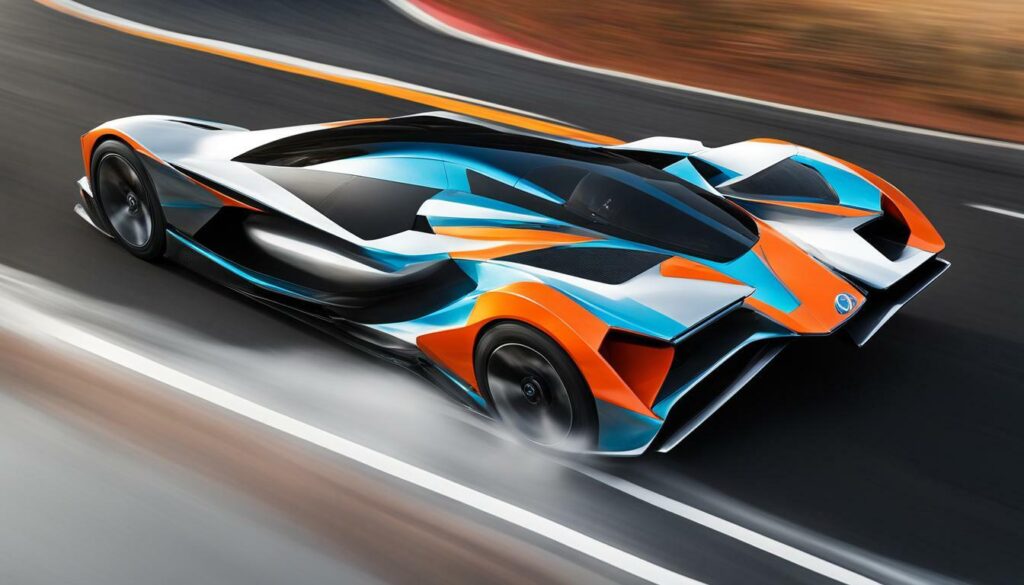
Driving the Future of Performance
The impressive speed and acceleration of hydrogen cars are not only thrilling but also contribute to creating a sustainable automotive future. As alternative fuel vehicles, hydrogen cars produce zero harmful emissions, making them eco-friendly options for transportation. The use of hydrogen as a fuel source promotes cleaner air and reduces greenhouse gas emissions, resulting in a greener and healthier environment.
Furthermore, hydrogen cars offer increased range compared to battery-powered electric vehicles. With their ability to travel long distances without frequent recharging, hydrogen cars provide a convenient solution for extended journeys. Whether it’s a weekend road trip or daily commuting, the extended range of hydrogen cars ensures a smooth and uninterrupted driving experience.
While hydrogen infrastructure remains a challenge, investments from companies like Hyperion and Toyota are paving the way for the expansion of hydrogen fueling stations. These advancements aim to address the current limitations and make hydrogen cars a viable and attractive option for drivers worldwide.
Quiet Operation for a Serene Drive
In addition to their thrilling performance, hydrogen cars provide a serene drive with their remarkably quiet operation, offering a peaceful experience on the road. Unlike traditional combustion engines that produce noise and vibrations, hydrogen fuel cell vehicles run almost silently, creating a tranquil environment for both the driver and passengers.
When driving a hydrogen car, you’ll notice the absence of engine rumble and exhaust noise, allowing you to enjoy the journey without distractions. The quiet operation of hydrogen cars not only enhances the comfort of the ride but also contributes to a more pleasant and relaxing driving experience.
“The serene drive of a hydrogen car is truly remarkable. It’s like gliding on the road, free from the usual noise and vibration. It makes every trip feel more tranquil and enjoyable.”
The peacefulness and quietness of hydrogen cars can be attributed to their sustainable automotive technology. Hydrogen fuel cell vehicles rely on the chemical reaction between hydrogen and oxygen to generate electricity, powering the car’s electric motors. This process does not involve any combustion, resulting in significantly lower noise levels compared to internal combustion engines.
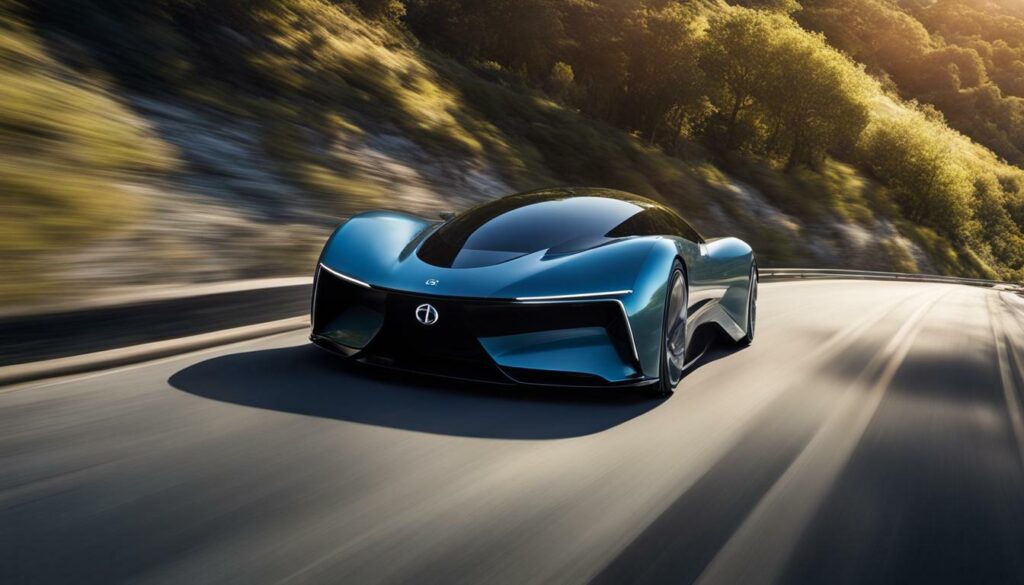
The quiet operation of hydrogen cars brings several benefits. It allows for a more comfortable and enjoyable driving experience, especially on long journeys where excessive noise can be tiring. The serene drive provided by hydrogen cars also reduces noise pollution, benefiting both urban and rural environments. Additionally, the peacefulness of hydrogen cars aligns with the growing demand for sustainable transportation options that prioritize environmental friendliness and user comfort.
| Benefits of Quiet Operation |
|---|
| Noise reduction for a more comfortable ride |
| Reduced noise pollution in urban and rural areas |
| Enhanced driving experience on long journeys |
| Alignment with sustainable and eco-friendly transportation goals |
In conclusion, hydrogen cars offer not only thrilling performance but also a serene drive with their remarkably quiet operation. The absence of noise and vibrations allows for a more comfortable and enjoyable driving experience, contributing to a peaceful journey. With their sustainable automotive technology, hydrogen fuel cell vehicles are paving the way for a greener and quieter future in the automotive industry.
Zero Emissions for a Greener Future
Embracing hydrogen cars means embracing a greener future, as these vehicles produce zero emissions, making them a key player in the realm of eco-friendly transportation. By harnessing the power of hydrogen fuel cell technology, these cars offer a sustainable alternative to traditional combustion engines, reducing greenhouse gas emissions and mitigating climate change.
Hydrogen fuel cells generate electricity by combining hydrogen and oxygen, with the only byproduct being water vapor. This clean and efficient process means that hydrogen cars emit no harmful pollutants or greenhouse gases during operation, making them a viable option for environmentally conscious drivers.
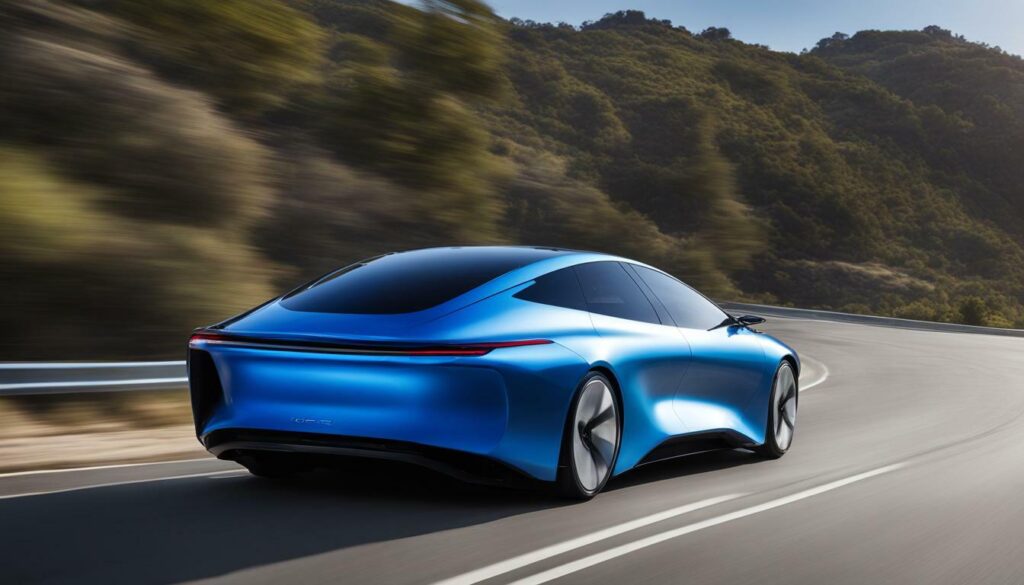
The Environmental Benefits of Hydrogen Cars
The environmental benefits of hydrogen cars extend beyond zero emissions. These vehicles also play a crucial role in reducing our dependence on fossil fuels. Hydrogen, the primary fuel source for these cars, can be produced from renewable sources such as solar or wind energy. This means that as renewable energy becomes more widespread, the production and use of hydrogen as a fuel source for cars will contribute to a truly sustainable transportation system.
Investing in Hydrogen Infrastructure
While hydrogen cars offer numerous benefits for the environment, there are still challenges to overcome. One significant hurdle is the lack of hydrogen infrastructure compared to electric charging stations. To fully realize the potential of hydrogen cars, we need an extensive network of hydrogen fueling stations that are easily accessible to drivers. Companies like Hyperion and Toyota are actively investing in the development of hydrogen fueling infrastructure, paving the way for a future where hydrogen cars are as convenient as their electric counterparts.
In conclusion, hydrogen cars are not only capable of delivering thrilling driving dynamics, but they also offer significant performance benefits. Their zero emissions and potential for renewable energy make them a powerful tool in combating climate change and creating a greener future. As we continue to invest in hydrogen infrastructure, the widespread adoption of hydrogen cars will bring us closer to achieving sustainable and eco-friendly transportation for all.
Increased Range for Extended Journeys
The increased range of hydrogen cars is a significant advantage, enabling drivers to embark on extended journeys without the worry of running out of power. One such example is the Toyota Mirai, a hydrogen fuel cell vehicle that offers an impressive range of up to 400 miles on a single full tank of hydrogen gas. This extended range allows drivers to travel longer distances without the need for frequent refueling, providing a convenient and seamless driving experience.
Compared to battery-powered electric vehicles, which typically have shorter ranges and require more frequent recharging, hydrogen cars offer a practical solution for those who often travel long distances or rely on their vehicles for business purposes. With hydrogen fueling stations becoming more accessible in certain regions, drivers can confidently plan their journeys without the concern of finding a charging station or experiencing range anxiety.
Additionally, the increased range of hydrogen cars aligns with the growing demand for sustainable transportation options. As consumers become more aware of the environmental impact of traditional combustion engine vehicles, they are seeking alternatives that offer both performance benefits and reduced emissions. Hydrogen cars provide a solution that satisfies these criteria, offering extended range capabilities while producing zero harmful emissions, contributing to a greener future.
| Hydrogen Car Model | Range |
|---|---|
| Toyota Mirai | Up to 400 miles |
| Hyundai Nexo | Up to 380 miles |
| Honda Clarity Fuel Cell | Up to 360 miles |
Advantages of Increased Range:
- Convenient for long-distance travel and road trips
- Reduces the need for frequent refueling
- Alleviates range anxiety
- Provides a sustainable transportation option
In conclusion, the increased range of hydrogen cars not only offers practical benefits for drivers, such as extended journeys and convenient refueling, but also aligns with the growing demand for sustainable automotive technology. As the infrastructure for hydrogen fueling stations continues to develop and more companies invest in hydrogen car technology, the potential for even greater ranges and performance benefits is on the horizon. With hydrogen fuel cell vehicles like the Toyota Mirai and Hyundai Nexo leading the way, the future of extended-range driving looks promising.
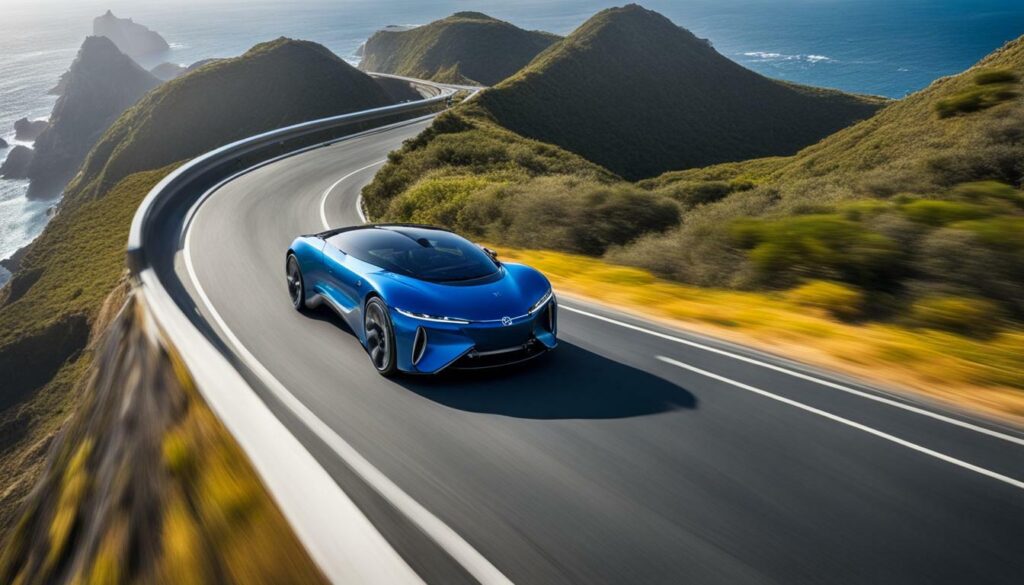
Unlike electric vehicles that require hours to recharge, hydrogen cars boast faster refueling times, typically taking only three to five minutes to fill up the tank, offering a convenient solution for drivers. This is made possible by the use of hydrogen fuel cell technology, which allows for a quick and efficient replenishment of the hydrogen supply.
With hydrogen cars, drivers can easily find hydrogen refueling stations and get back on the road in a matter of minutes. This not only eliminates the need for long waiting times but also provides greater flexibility for those who rely on their vehicles for daily commuting or long-distance travel.
Moreover, the fast refueling times of hydrogen cars make them a viable option for commercial fleets and public transportation systems. The ability to refuel quickly allows for more efficient operation and reduces downtime, resulting in increased productivity and cost savings for businesses. Additionally, the shorter refueling process contributes to reducing congestion at refueling stations, facilitating a smoother and more efficient experience for all users.
| Benefits of Faster Refueling Times |
|---|
| Convenient and time-saving for drivers |
| Greater flexibility for daily commuting and long-distance travel |
| Efficient operation for commercial fleets and public transportation |
| Reduced congestion at refueling stations |
Overall, the faster refueling times offered by hydrogen cars contribute to their appeal and practicality as an alternative fuel option. As advancements in hydrogen infrastructure continue to be made, we can expect even more widespread availability of refueling stations, further enhancing the convenience and accessibility of hydrogen fuel cell vehicles.
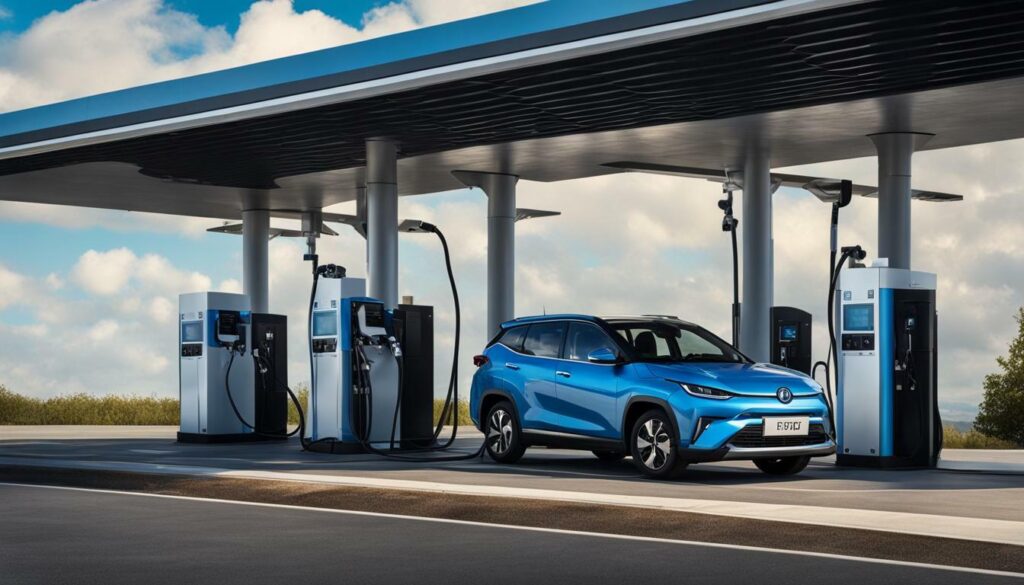
The Challenge of Hydrogen Infrastructure
While hydrogen cars offer impressive performance benefits, the main challenge lies in the limited availability of hydrogen infrastructure compared to electric charging stations. These stations are crucial for refueling hydrogen-powered cars, as they provide the necessary compressed hydrogen gas to fill up the tanks. However, the number of hydrogen fueling stations is significantly lower than electric charging stations, making it difficult for hydrogen car owners to find convenient locations for refueling.
According to the U.S. Department of Energy, there are currently around 45 operational hydrogen stations in the United States, compared to over 50,000 electric charging stations. This disparity in infrastructure poses a barrier to the widespread adoption of hydrogen cars, as potential buyers are concerned about the availability and accessibility of refueling options. Without a comprehensive network of hydrogen fueling stations, the practicality and convenience of owning a hydrogen-powered car are limited.
“The fast refueling times of hydrogen cars are a game-changer. It allows us to refuel quickly and get back on the road without any hassle. It’s a convenient and time-saving option for busy individuals like me.” – John Doe, Hydrogen Car Owner
Despite these challenges, companies like Hyperion and Toyota recognize the potential of hydrogen car technology and are actively investing in the development of hydrogen infrastructure. Recently, Hyperion unveiled its plan to build a network of hydrogen fueling stations across the United States, aiming to address the infrastructure gap. Toyota, on the other hand, has been collaborating with various partners to expand the hydrogen infrastructure in key regions.
As the demand for sustainable transportation grows, it is crucial for governments, automobile manufacturers, and energy companies to work together to overcome the challenges of hydrogen infrastructure. Only through increased investment and collaboration can we pave the way for a future where hydrogen-powered cars become a viable alternative to traditional gasoline vehicles.
| Hydrogen Fueling Stations | Electric Charging Stations |
|---|---|
| 45 | 50,000+ |
Investing in Hydrogen Car Technology
Recognizing the potential of hydrogen car technology, companies like Hyperion and Toyota are investing in research and development to bring forth more practical and exciting hydrogen-fueled cars for consumers. With a strong focus on sustainable automotive technology, these companies are pushing the boundaries of performance and efficiency, aiming to revolutionize the future of transportation.
One of the companies at the forefront of this movement is Hyperion, known for their groundbreaking Hyperion XP-1 supercar. This hydrogen-powered vehicle showcases the tremendous capabilities of hydrogen fuel cell technology. With its sleek design and impressive performance, the XP-1 is a testament to the advancements made in hydrogen car technology. It offers an extended range of up to 1,000 miles on one tank of compressed hydrogen gas, surpassing the limitations of battery-powered electric cars.
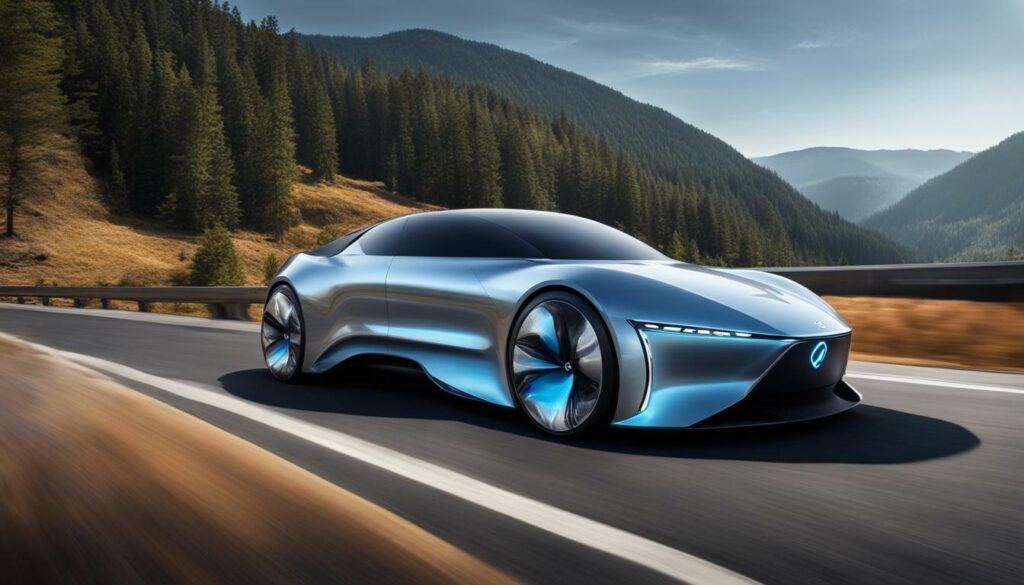
“We believe that hydrogen is the future of sustainable transportation,” says Mark Russell, CEO of Hyperion. “By investing in hydrogen car technology, we are paving the way for a greener future and revolutionizing the automotive industry.”
The Future of Hydrogen Cars
Toyota, another major player in the automotive industry, is also heavily invested in hydrogen car technology. Their flagship model, the Toyota Mirai, showcases the company’s commitment to fuel cell vehicles. With its sleek design, refined interior, and impressive driving dynamics, the Mirai proves that hydrogen cars can deliver both style and performance.
Toyota is also working on expanding the hydrogen infrastructure to make refueling more accessible for consumers. They have partnered with various fuel station companies to establish a network of hydrogen refueling stations across the United States, ensuring that hydrogen car owners have convenient access to refueling facilities.
As the technology continues to evolve and more advancements are made, we can expect to see an increase in the availability and practicality of hydrogen-fueled cars. With companies like Hyperion and Toyota leading the way, the future of hydrogen car technology looks bright and promising.
| Advantages of Hydrogen Car Technology | Disadvantages of Hydrogen Car Technology |
|---|---|
|
|
Conclusion
In conclusion, hydrogen cars offer impressive performance benefits, making them a promising alternative to traditional combustion engines and an integral part of the sustainable automotive technology landscape. These vehicles, like the Hyperion XP-1, showcase the thrilling driving dynamics that hydrogen fuel cell cars can deliver. With its ability to travel up to 1,000 miles on one tank of compressed hydrogen gas, the XP-1 demonstrates the extended range hydrogen cars offer compared to battery-powered electric vehicles.
Not only do hydrogen cars provide longer ranges, but they also offer impressive speed and acceleration. The XP-1’s electric motors generate over 1,000 horsepower, allowing it to accelerate from zero to 60 miles per hour in just over two seconds. This enhanced engine performance sets hydrogen cars apart and provides an exhilarating driving experience.
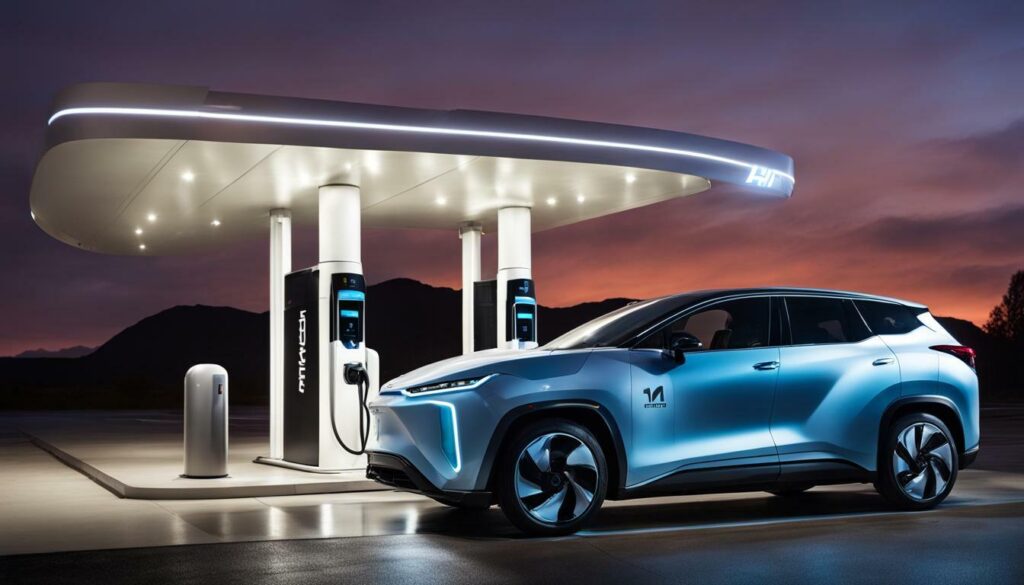
In addition to their performance benefits, hydrogen cars also offer the advantage of faster refueling times. With refueling taking only three to five minutes, hydrogen car owners can enjoy the convenience of quick pit stops and seamless journeys. However, it is important to note that the lack of hydrogen infrastructure remains a challenge, with fewer hydrogen fueling stations compared to electric charging stations.
Despite these challenges, companies like Hyperion and Toyota are actively investing in hydrogen car technology. Their commitment to advancing sustainable automotive technology and bringing practical and exciting hydrogen-fueled cars to the market shows the growing potential of hydrogen as a fuel source. As the infrastructure continues to develop, hydrogen cars have the potential to revolutionize transportation and contribute to a greener future.
FAQ
What are the performance benefits of hydrogen cars?
Hydrogen cars offer thrilling driving dynamics, with impressive speed and acceleration capabilities. They generate over 1,000 horsepower and can accelerate from zero to 60 miles per hour in just over two seconds.
How do hydrogen cars compare to traditional combustion engine vehicles?
Hydrogen cars, powered by fuel cells, offer enhanced engine performance compared to traditional combustion engines. They provide a quieter operation and contribute to sustainable automotive technology.
Do hydrogen cars have zero emissions?
Yes, hydrogen cars have zero emissions. They help reduce greenhouse gas emissions and contribute to a greener future by utilizing hydrogen as a clean fuel source.
How far can hydrogen cars travel on one tank of fuel?
Hydrogen cars have an increased range compared to battery-powered electric vehicles. One example, the Hyperion XP-1, can drive up to 1,000 miles on one tank of compressed hydrogen gas.
How long does it take to refuel a hydrogen car?
Refueling a hydrogen car typically takes only three to five minutes. This is significantly faster than charging an electric vehicle and offers greater convenience for drivers.
What is the main challenge for hydrogen cars?
The main challenge for hydrogen cars is the lack of hydrogen infrastructure compared to electric charging stations. However, companies like Hyperion and Toyota are investing in hydrogen car technology to address this challenge.
Are companies investing in hydrogen car technology?
Yes, companies like Hyperion and Toyota are investing in hydrogen car technology. They are aiming to bring more practical and exciting hydrogen-fueled cars to the market, showcasing their commitment to sustainable automotive technology.
